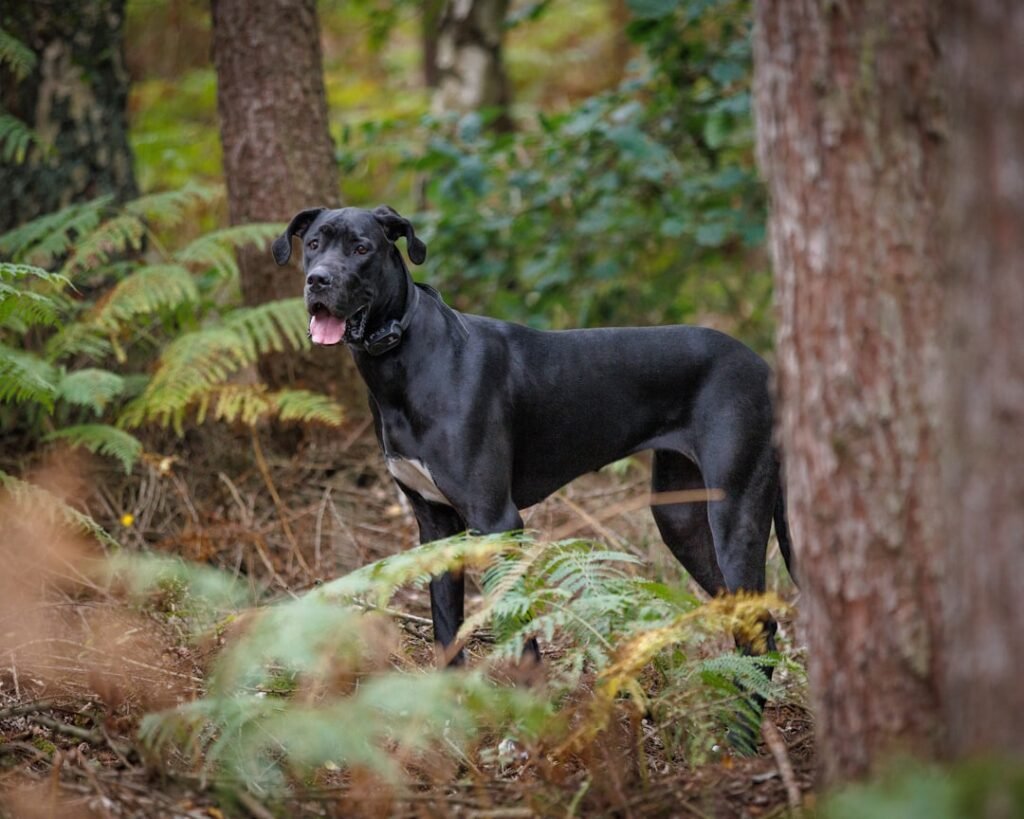The Great Dane is a majestic and noble breed that is known for its large size and gentle nature. They are often referred to as the “gentle giants” of the dog world. Great Danes are one of the tallest dog breeds, with males standing at least 30 inches at the shoulder and weighing between 140 to 175 pounds. Despite their imposing size, they are known for their friendly and affectionate temperament, making them a popular choice for families.
Great Danes have a short, smooth coat that comes in a variety of colors, including fawn, brindle, black, blue, and harlequin. They have a muscular build and a regal appearance, with a long, elegant neck and a deep chest. Their expressive eyes and floppy ears give them a friendly and approachable look.
Key Takeaways
- Great Danes are a large and majestic breed known for their gentle nature and loyalty.
- The breed originated in Germany and was originally used for hunting wild boar.
- Great Danes are known for being friendly and patient with children, but can also be protective of their family.
- When choosing a Great Dane, it’s important to consider their size, energy level, and temperament to ensure they are a good fit for your family.
- Great Danes require a high-quality diet and regular grooming to maintain their health and appearance.
The history and origin of the Great Dane
The Great Dane’s origins can be traced back to Germany, where they were originally bred as hunting dogs. They were used to hunt wild boar and deer, as well as to guard estates and protect livestock. The breed was developed by crossing English Mastiffs with Irish Wolfhounds, resulting in a dog that had the size and strength of a Mastiff but the speed and agility of a Wolfhound.
Over time, the breed evolved into the Great Dane that we know today. They were recognized as a distinct breed in Germany in the late 19th century and quickly gained popularity throughout Europe. In the early 20th century, Great Danes were imported to the United States and became popular as show dogs and family pets.
Throughout history, Great Danes have been admired for their beauty and grace. They have been depicted in art and literature, with famous examples including the painting “The Blue Boy” by Thomas Gainsborough and the novel “Scooby-Doo” by James Gunn.
Understanding the temperament of Great Danes
Great Danes are known for their friendly and gentle nature. They are typically good-natured and get along well with children and other animals. They are loyal and protective of their families, making them excellent guard dogs. However, they can be reserved and aloof with strangers, so early socialization is important to ensure that they are comfortable in different situations.
Training and socialization are crucial for Great Danes, as their large size can make them difficult to handle if they are not properly trained. They are intelligent dogs that respond well to positive reinforcement training methods. Consistency and patience are key when training a Great Dane, as they can be stubborn at times.
It is important to provide your Great Dane with plenty of mental and physical stimulation to prevent boredom and destructive behavior. They enjoy activities such as obedience training, agility, and tracking. Regular exercise is also important for their overall health and well-being.
Choosing the right Great Dane for your family
| Criteria | Description |
|---|---|
| Size | Great Danes are one of the largest dog breeds, so make sure you have enough space for them to move around comfortably. |
| Temperament | Great Danes are known for their gentle and friendly nature, but they can also be protective of their family. |
| Activity level | Great Danes are generally low-energy dogs, but they still need regular exercise to stay healthy and happy. |
| Grooming needs | Great Danes have short hair and don’t require a lot of grooming, but they do shed and need regular brushing. |
| Health issues | Great Danes are prone to certain health issues, such as hip dysplasia and bloat, so it’s important to choose a breeder who screens for these conditions. |
| Training | Great Danes are intelligent dogs, but they can be stubborn and may require patience and consistency in training. |
When selecting a Great Dane, there are several factors to consider. First and foremost, you should consider your lifestyle and living situation. Great Danes require a lot of space to move around, so they are not well-suited for apartment living. They also need a secure yard with a high fence to prevent them from escaping.
It is also important to consider the size and energy level of the dog. Great Danes are large dogs that require a lot of exercise, so they may not be suitable for families with young children or elderly individuals who may have difficulty handling them.
When looking for a Great Dane, it is important to find a reputable breeder who breeds for health and temperament. A good breeder will provide you with health clearances for the parents of the puppies and will be able to answer any questions you may have about the breed.
If you prefer to adopt a Great Dane, there are many rescue organizations that specialize in the breed. These organizations often have Great Danes of all ages available for adoption and can help match you with the right dog for your family.
Feeding and nutritional requirements of Great Danes
Great Danes have specific nutritional needs due to their large size and rapid growth rate. It is important to feed them a balanced diet that is appropriate for their age and activity level. A high-quality commercial dog food that is formulated for large breed puppies or adults is usually recommended.
Puppies should be fed a diet that is specifically formulated for large breed puppies to ensure that they receive the proper balance of nutrients for healthy growth. It is important to avoid overfeeding puppies, as rapid growth can put stress on their developing bones and joints.
Adult Great Danes should be fed a diet that is appropriate for their size and activity level. They should be fed two or three meals a day to prevent bloat, a potentially life-threatening condition that is common in large breed dogs.
It is important to monitor your Great Dane’s weight and adjust their portion sizes as needed. Obesity can lead to a variety of health problems, so it is important to keep your Great Dane at a healthy weight.
Grooming and hygiene for your Great Dane

Great Danes have a short, smooth coat that requires minimal grooming. They are moderate shedders and only require occasional brushing to remove loose hair. Regular bathing is not necessary unless they become dirty or smelly.
It is important to regularly check your Great Dane’s ears for signs of infection or irritation. Their floppy ears can trap moisture, which can lead to ear infections. Cleaning their ears with a veterinarian-recommended ear cleaner can help prevent infections.
Great Danes are prone to dental problems, so it is important to brush their teeth regularly to prevent plaque buildup and gum disease. Regular nail trims are also important to prevent overgrowth and discomfort.
Exercise needs of Great Danes
Despite their large size, Great Danes are relatively low-energy dogs. They require moderate exercise to keep them healthy and prevent obesity. Daily walks and play sessions in a secure area are usually sufficient to meet their exercise needs.
It is important to avoid excessive exercise in Great Danes, especially when they are young and still growing. Their bones and joints are still developing, and too much exercise can put stress on them and increase the risk of injury.
Great Danes also enjoy mental stimulation, so providing them with puzzle toys and interactive games can help keep them entertained and prevent boredom.
Health concerns and preventative care for Great Danes
Great Danes are generally healthy dogs, but they are prone to certain health issues. Some of the most common health problems in Great Danes include hip dysplasia, bloat, heart disease, and certain types of cancer.
Regular veterinary care is important for Great Danes to monitor their overall health and catch any potential health problems early. They should receive regular vaccinations, flea and tick prevention, and heartworm prevention.
It is also important to provide your Great Dane with a comfortable and supportive bed to prevent joint problems. Elevated feeding bowls can help prevent bloat by reducing the amount of air that they swallow while eating.
Training and socialization tips for Great Danes
Training and socialization are crucial for Great Danes to ensure that they grow up to be well-behaved and well-adjusted dogs. Early socialization is important to expose them to different people, animals, and environments. This will help them become comfortable in different situations and reduce the risk of fear or aggression.
Positive reinforcement training methods work best with Great Danes. They respond well to praise, treats, and rewards. Consistency and patience are key when training a Great Dane, as they can be stubborn at times.
It is important to start training your Great Dane from a young age and to continue training throughout their life. Obedience training can help them learn basic commands and manners, while advanced training can provide mental stimulation and challenge.
Living with a Great Dane: Tips for a happy and healthy home
Living with a Great Dane can be a rewarding experience, but it is important to create a safe and comfortable living environment for them. They require plenty of space to move around, so a large, secure yard is ideal. They also need a comfortable bed that provides support for their joints.
Great Danes are social animals and thrive on human companionship. They should be allowed to spend time indoors with their family and should not be left alone for long periods of time.
It is important to manage your Great Dane’s behavior at home to prevent destructive behavior. Providing them with plenty of toys and mental stimulation can help keep them entertained and prevent boredom.
Regular veterinary care, proper nutrition, exercise, and training are all important for keeping your Great Dane happy and healthy in your home. With the right care and attention, your Great Dane can be a loving and loyal companion for many years to come.


